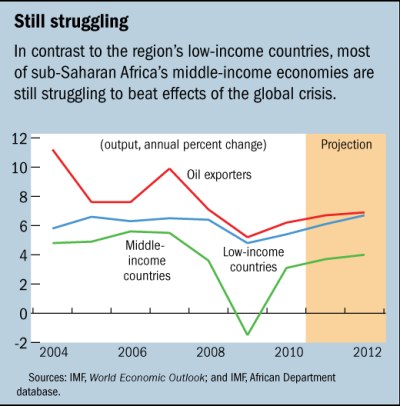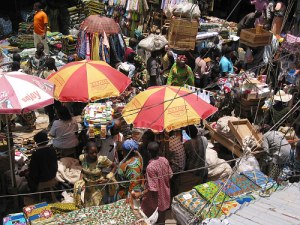
Sustained Growth Vital for Reducing Poverty

Growth in Africa has to be sustained, and there are ways to work towards producing more jobs, the head of the IMF's Africa Department, Antoinette Sayeh, tells AllAfrica.
There are also things that can be done to build up the skills of the young population to be able to then take on some of the jobs that could be produced down the road, she says.
Africa's Low-income Countries Lead Growth Forecast
Bill of Fare: Food Prices in Senegal
Food prices are spiking again in Africa, but Senegals authorities, advised by the IMF, have acted to help shield the West African countrys poor from international food price volatility. A drive for self-sufficiency in food is part of the strategy, according to Simon Willson, senior external relations officer for the IMF.
Tax Matters for Developing Countries

Carlo Cottarelli
You hear a lot these daysnot least from meabout the fiscal problems of advanced economies. But lets not forget the fiscal problems that low-income countries face, though they are of a different kind. For all too many low-income countries, government tax revenues are far from enough to meet the needs of their people. Some have made good progress, and this helped them weather the crisis better than many advanced economiesbut there is an underlying, quiet crisis of inadequately resourced governments. Nor is it just the level of revenue that matters; tax design and implementation are also critical to the efficiency of economic activity, to fairness, and to the legitimacy of the state.
Africa's Low-income Countries Lead Growth Forecast
Another year of strong growth is in prospect for most of the 29 low-income countries in sub-Saharan Africa. The IMFs latest Regional Economic Outlook projects that these countries output will expand on average by six percent in 2011, compared with last years 5.5 percent pace. This performance would be on a par with the regions high-growth surge in the mid-2000s. The main engines of the LICs expansion are expected to be exports and private consumption, with the public sector taking more of a back seat. The omens are good also for oil-exporting countries. Booming oil revenues are already filtering through to many non-oil sectors and easing government financing constraints. A big question is whether governments will be able to exercise sufficient control over government spending to prevent boom-bust cycles.
Confessions of a Dismal Scientist - Africa's Resilience

Abebe Aemro Selassie
Like many economists, I tend to fear the worst. I have witnessed phenomenal changes for the better in sub-Saharan Africa over the past 20 odd years. Part of me still worries that this trajectory will not endure. But, the more I see of the regions economic performance and outlook, the more Im changing my tune. Until my latest source for anxiety took hold a few months ago (more on this in a moment), Id worried about the impact of the global financial crisis on sub-Saharan Africa. The crisis hit just as many countries in the region were starting to enjoy a hard-earned period of economic growth, their best since at least the 1970s. I did not want this to be derailed by the crisis. Previous global economic slowdowns were unkind to the region. While other regions tended to recover quickly, recoveries in sub-Saharan Africa tended to be more protracted, looking more U- or even L-shaped. So, in the face of the worst period for the global economy in two-generations, what chance did the still fragile economies have?
Rwanda: Open for Business
Rwanda is establishing a record of high growth, economic stability and falling external debt. Decisively moving on from a war-scarred past, Rwanda is on a drive to attract entrepreneurs and risk-takers, and to be East Africas next enterprise zone.
Raising Government Revenue in Africa: A Road Out of Poverty

Mark Plant
Governments in Africa have a prime objectiveto reduce poverty. To improve living standards and create jobs, they need to provide their citizens with better healthcare, better education and more infrastructure. They need to build hospitals, schools, and to pay doctors, nurses, teachers. All this costs money. How to pay for this - in a way that is both fair and efficient - is a question that all governments face.
South Africas Unemployment Puzzle

Abebe Aemro Selassie
Among the havoc wrought by the global financial crisis, unemployment ranks at the top. This discussion often focuses on the situation in advanced countries. Unemployment in the United States, for example, continues to hover around nine percent. Take that and double it. Then you can beginyes, just beginto get a sense of the magnitude of the problem in South Africa. Unemployment in South Africa now stands at some 24 percent. Youth unemployment is phenomenally higher still at about 50 percent.
L'économie Ouest Africaine est menacée par la crise en Côte d'Ivoire
Malgré avoir surmonter les crises alimentaire et pétrolière de 2007-08 et la crise financière mondiale, la reprise économique de l'Afrique occidentale est menacée par la crise politique en Côte d'Ivoire. L'impact économique des élections nationales, se répecute sur les pays membres de l'UEMOA. Le FMI prévient que sans une solution rapide et pacifique en Côte d'Ivoire, la reprise dans la région pourrait être durement affectée. Norbert Funke, FMI Dépt. Afrique Modératrice: Lika Gueye, Relations Extérieures du FMI
L'augmentation des impôts et la réduction de la pauvreté
Selon Benjamin Franklin, l'un des pères fondateurs de l'Amérique,"les deux choses qui sont certaines dans la vie sont la mort et les impôts." Cela est peut être vrai, mais pour de nombreux pays en développement, c'est encore un défi de mettre en place un système d'impôts effectif et efficace malgré les besoins immédiats de dépenses sociales. Le FMI vise à apprendre des pays en Afrique qui ont réussi à réformer leurs propres systèmes et politiques fiscales Mark Plant, FMI Dépt. Afrique Modérateur: Raphael Anspach, Relations Extérieures du
L'évolution des échanges commerciaux en Afrique
Avant la crise économique mondiale, l'Afrique a connu une forte hausse de ses exportations, ainsi que le développent de nouvelles relations commerciales avec différentes parties du monde. Cependant, il reste encore des challenges a surmonter afin de mieux intégrer le continent dans le système commercial mondial. Montfort Mlachila, FMI Dépt. Afrique Modératrice: Lika Gueye, Relations Extérieures du FMI
La hausse du prix des denrées alimentaires en Afrique
Selon l'organisation des Nations Unies pour l'alimentation et l'agriculture, la FAO, les prix des denrées alimentaires sur le marché mondial ont atteint des niveaux sans précédent le mois dernier. Quelles sont les mécanismes qui causent ces hausses? Que cela implique t'il pour l'Afrique subsaharienne? Shaun Roache, FMI Dépt. Afrique Hassan Zaman, Banque Mondiale. Narratrice: Lika Gueye, Relations Extérieures du FMI
Les perspectives de la finance islamique en Afrique
La finance Islamique a généré un intérêt global palpable. Elle a aussi piqué l'intérêt des pays Africains grace à sa résilience durant la crise financière de 2008. Plusieurs gouvernement s'intéressent dorénavant à ce type de service comme un nouveau moyen de financement. 22 fevrier 2011 Amadou Sy, FMI Marché monétaire et des capitaux
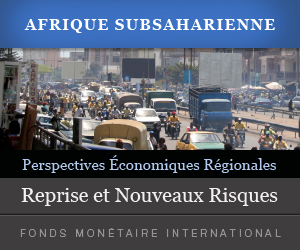
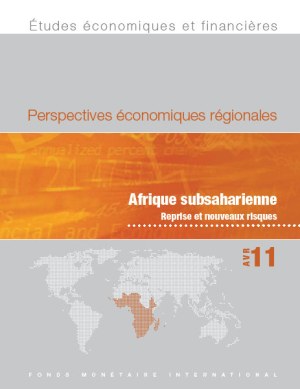
Les perspectives de la finance islamique en Afrique
La finance Islamique a généré un intérêt global palpable. Elle a aussi piqué l'intérêt des pays Africains grace à sa résilience durant la crise financière de 2008. Plusieurs gouvernement s'intéressent dorénavant à ce type de service comme un nouveau moyen de financement. 22 fevrier 2011 Amadou Sy, FMI Marché monétaire et des capitaux
La hausse du prix des denrées alimentaires en Afrique
Selon l'organisation des Nations Unies pour l'alimentation et l'agriculture, la FAO, les prix des denrées alimentaires sur le marché mondial ont atteint des niveaux sans précédent le mois dernier. Quelles sont les mécanismes qui causent ces hausses? Que cela implique t'il pour l'Afrique subsaharienne? Shaun Roache, FMI Dépt. Afrique Hassan Zaman, Banque Mondiale. Narratrice: Lika Gueye, Relations Extérieures du FMI
Development in the Post-Crisis Period
Lesetja Kganyago, director-general of South Africas National Treasury and chair of the G-24, at a press conference during the IMF spring meetings on April 14, 2011. Addressing challenges facing the developing world, he said, "Beyond the recovery the environment for growth and employment development in the post-crisis period will be characterized by major structural changes. A major challenge is how to ensure growth in the future is inclusive and employment intensive."
2011 Spring Meetings Panel of African Finance Ministers
The panel of African Finance Ministers included: Tendai Biti, Zimbabwe's minister of Finance; Timothy Thahane, Lesotho's minister of Finance and Development Planning; Adji Oteth Ayassor, Togo's minister of Economy and Finance; Gata Ngoulou, Chad's minister of Finance and Budget; Ismaila Dieng, IMF's External Relations Department
Africa Should Cut Reliance on Commodity Exports Ministers
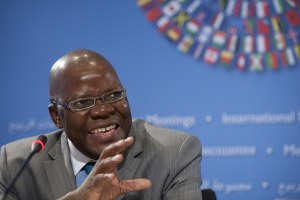 IMF /Cliff Owen
IMF /Cliff Owen
Tendai Biti, Zimbabwe's Finance minister, speaks with reporters during a news conference on Africa during the IMF World Bank spring meetings in Washington, Friday April 16, 2011.
Africa should broaden its economic base and not remain so dependent on commodity exports for its growth, African finance ministers said during the IMF-World Bank spring meetings in Washington.





